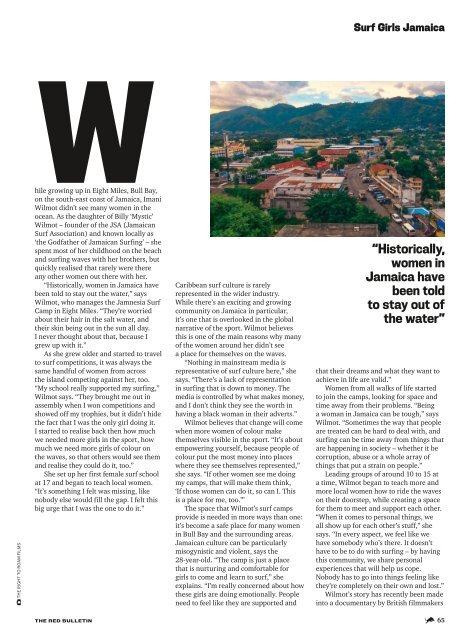You also want an ePaper? Increase the reach of your titles
YUMPU automatically turns print PDFs into web optimized ePapers that Google loves.
Surf Girls Jamaica<br />
THE RIGHT TO ROAM FILMS<br />
While growing up in Eight Miles, Bull Bay,<br />
on the south-east coast of Jamaica, Imani<br />
Wilmot didn’t see many women in the<br />
ocean. As the daughter of Billy ‘Mystic’<br />
Wilmot – founder of the JSA (Jamaican<br />
Surf Association) and known locally as<br />
‘the Godfather of Jamaican Surfing’ – she<br />
spent most of her childhood on the beach<br />
and surfing waves with her brothers, but<br />
quickly realised that rarely were there<br />
any other women out there with her.<br />
“Historically, women in Jamaica have<br />
been told to stay out the water,” says<br />
Wilmot, who manages the Jamnesia Surf<br />
Camp in Eight Miles. “<strong>The</strong>y’re worried<br />
about their hair in the salt water, and<br />
their skin being out in the sun all day.<br />
I never thought about that, because I<br />
grew up with it.”<br />
As she grew older and started to travel<br />
to surf competitions, it was always the<br />
same handful of women from across<br />
the island competing against her, too.<br />
“My school really supported my surfing,”<br />
Wilmot says. “<strong>The</strong>y brought me out in<br />
assembly when I won competitions and<br />
showed off my trophies, but it didn’t hide<br />
the fact that I was the only girl doing it.<br />
I started to realise back then how much<br />
we needed more girls in the sport, how<br />
much we need more girls of colour on<br />
the waves, so that others would see them<br />
and realise they could do it, too.”<br />
She set up her first female surf school<br />
at 17 and began to teach local women.<br />
“It’s something I felt was missing, like<br />
nobody else would fill the gap. I felt this<br />
big urge that I was the one to do it.”<br />
Caribbean surf culture is rarely<br />
represented in the wider industry.<br />
While there’s an exciting and growing<br />
community on Jamaica in particular,<br />
it’s one that is overlooked in the global<br />
narrative of the sport. Wilmot believes<br />
this is one of the main reasons why many<br />
of the women around her didn’t see<br />
a place for themselves on the waves.<br />
“Nothing in mainstream media is<br />
representative of surf culture here,” she<br />
says. “<strong>The</strong>re’s a lack of representation<br />
in surfing that is down to money. <strong>The</strong><br />
media is controlled by what makes money,<br />
and I don’t think they see the worth in<br />
having a black woman in their adverts.”<br />
Wilmot believes that change will come<br />
when more women of colour make<br />
themselves visible in the sport. “It’s about<br />
empowering yourself, because people of<br />
colour put the most money into places<br />
where they see themselves represented,”<br />
she says. “If other women see me doing<br />
my camps, that will make them think,<br />
‘If those women can do it, so can I. This<br />
is a place for me, too.’”<br />
<strong>The</strong> space that Wilmot’s surf camps<br />
provide is needed in more ways than one:<br />
it’s become a safe place for many women<br />
in Bull Bay and the surrounding areas.<br />
Jamaican culture can be particularly<br />
misogynistic and violent, says the<br />
28-year-old. “<strong>The</strong> camp is just a place<br />
that is nurturing and comfortable for<br />
girls to come and learn to surf,” she<br />
explains. “I’m really concerned about how<br />
these girls are doing emotionally. People<br />
need to feel like they are supported and<br />
“Historically,<br />
women in<br />
Jamaica have<br />
been told<br />
to stay out of<br />
the water”<br />
that their dreams and what they want to<br />
achieve in life are valid.”<br />
Women from all walks of life started<br />
to join the camps, looking for space and<br />
time away from their problems. “Being<br />
a woman in Jamaica can be tough,” says<br />
Wilmot. “Sometimes the way that people<br />
are treated can be hard to deal with, and<br />
surfing can be time away from things that<br />
are happening in society – whether it be<br />
corruption, abuse or a whole array of<br />
things that put a strain on people.”<br />
Leading groups of around 10 to 15 at<br />
a time, Wilmot began to teach more and<br />
more local women how to ride the waves<br />
on their doorstep, while creating a space<br />
for them to meet and support each other.<br />
“When it comes to personal things, we<br />
all show up for each other’s stuff,” she<br />
says. “In every aspect, we feel like we<br />
have somebody who’s there. It doesn’t<br />
have to be to do with surfing – by having<br />
this community, we share personal<br />
experiences that will help us cope.<br />
Nobody has to go into things feeling like<br />
they’re completely on their own and lost.”<br />
Wilmot’s story has recently been made<br />
into a documentary by British filmmakers<br />
THE RED BULLETIN 65

















